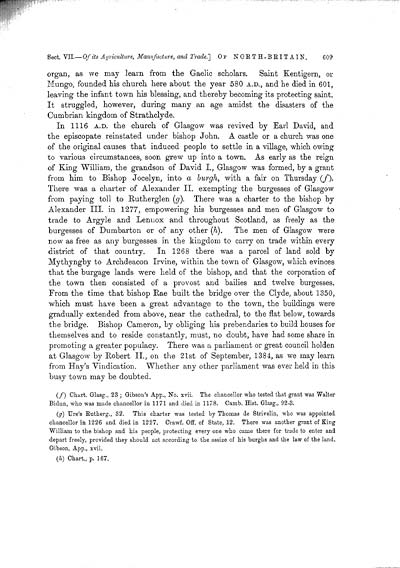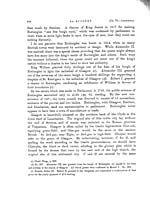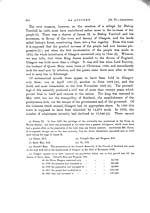Volume 6
(168) Page 609
Download files
Individual page:
Thumbnail gallery: Grid view | List view

609 organ, as we may learn from the Gaelic scholars. Saint Kentigern, or Mungo, founded his church here about the year 580 A.D., and he died in 601, leaving the infant town his blessing, and thereby becoming its protecting saint. It struggled, however, during many an age amidst the disasters of the Cumbrian kingdom of Strathclyde. In 1116 A.D. the church of Glasgow was revived by Earl David, and the episcopate reinstated under bishop John. A castle or a church was one of the original causes that induced people to settle in a village, which owing to various circumstances, soon grew up into a town. As early as the reign of King William, the grandson of David I., Glasgow was formed, by a grant from him to Bishop Jocelyn, into a burgh, with a fair on Thursday (f). There was a charter of Alexander II. exempting the burgesses of Glasgow from paying toll to Rutherglen (g). There was a charter to the bishop by Alexander III. in 1277, empowering his burgesses and men of Glasgow to trade to Argyle and Lennox and throughout Scotland, as freely as the burgesses of Dumbarton or of any other (h). The men of Glasgow were now as free as any burgesses in the kingdom to carry on trade within every district of that country. In 1268 there was a parcel of land sold by Mythyngby to Archdeacon Irvine, within the town of Glasgow, which evinces that the burgage lands were held of the bishop, and that the corporation of the town then consisted of a provost and bailies and twelve burgesses. From the time that bishop Rae built the bridge over the Clyde, about 1350, which must have been a great advantage to the town, the buildings were gradually extended from above, near the cathedral, to the flat below, towards the bridge. Bishop Cameron, by obliging his prebendaries to build houses for themselves and to reside constantly, must, no doubt, have had some share in promoting a greater populacy. There was a parliament or great council holden at Glasgow by Robert II., on the 21st of September, 1384, as we may learn from Hay's Vindication. Whether any other parliament was ever held in this busy town may be doubted. (f) Chart. Glasg., 23 ; Gibson's App., No. xvii. The chancellor who tested that grant was Walter Bidun, who was made chancellor in 1171 and died in 1178. Camb. Hist. Glasg., 92-3. (g) Ure's Rutherg., 32. This charter was tested by Thomas de Strivelin, who was appointed chancellor in 1226 and died in 1227. Crawf. Off. of State, 12. There was another grant of King William to the bishop and his people, protecting every one who came there for trade to enter and depart freely, provided they should act according to the assize of his burghs and the law of the land. Gibson, App., xvii. (h) Chart., p. 167.
Set display mode to:
![]() Universal Viewer |
Universal Viewer | ![]() Mirador |
Large image | Transcription
Mirador |
Large image | Transcription
Images and transcriptions on this page, including medium image downloads, may be used under the Creative Commons Attribution 4.0 International Licence unless otherwise stated. ![]()
| Caledonia, or, An account, historical and topographic of North Britain from the most ancient to the present times > Volume 6 > (168) Page 609 |
|---|
| Permanent URL | https://digital.nls.uk/74531366 |
|---|---|
| Description | Vol. VI. |
|---|---|
| Attribution and copyright: |
|

